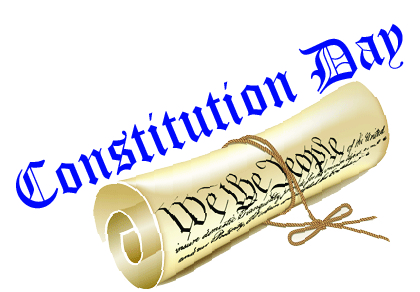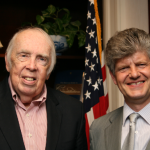Remembering the U. S. Constitution: The Law of the Land

Republican presidents from Dwight D. Eisenhower to George H. W. Bush have referred to U. S. Supreme Court decisions as “the law of the land.” Actually, that distinction belongs to the document we celebrate today—the U. S. Constitution.

If you want a good treatise on it, read The Theme Is Freedom: Religion, Politics, and the American Tradition by M. Stanton Evans.(Full disclosure: I have a research credit in it.) “In fact, the Constitution was the work not of a moment, an hour, or even a lifetime, but of two millennia of Western thought, political struggle and hard-won knowledge about the state,” Evans wrote. “The Constitution is an almost perfect summation of the themes expounded in this essay.”
“Virtually every doctrine, value, institutional development and painful lesson gleaned through all the centuries since Magna Carta converged on the Statehouse in Philadelphia in the summer of 1787.” It’s staggering to realize that the original delegates to the Constitutional Convention had an intimate understanding of the history which preceded it: You would be hard put to find members of the current Congress who have a working knowledge of the past 230 years since those storied statesmen convened.
“Here were combined the notions of the law above the king, the need to impose restraints on power, the wisdom of diffusing authority instead of having it focused in one center, that were the chief political doctrines of a free society, annealed and tested in the fires of battle,” Evans wrote of the Constitutional Conventions. “As noteworthy as the ideas that guided the convention were the men who held them.”
“While perhaps not quite an ‘assembly of demi-gods,’ as Jefferson put it, the people who attended made an impressive muster: Washington and Franklin, Madison and Hamilton, Dickinson and Wilson, John Rutledge and Roger Sherman, George Mason and George Wythe, Oliver Ellsworth and Elbridge Gerry.”
It’s hard not to think of a classic routine political satirist Mort Sahl used during the 1972 campaign, “In less than 200 years, we’ve gone from Madison and Adams to Nixon and McGovern.”
“What can we make of this? Darwin was wrong!” In other words, this devolution in statesmen was proof positive, at least politically, that we did not evolve into a higher species.
“Despite the absence of Jefferson, Patrick Henry and the Adamses, this was a company of heroes, distinguished for character, principle, and understanding,” Evans wrote of the founders. “If one were looking for signs of providential care in the creation of America—and the framers often did—it would be found in the gathering of these men, with these particular qualities, at this juncture of our history.”
Evans goes on to describe the debate itself. What is interesting about that description is that those original debates over the Constitution were the exact obverse of current congressional discourse should give us pause because the former were so stunningly successful while the latter rarely are. If the Hippocratic Oath—“First do no harm”—were taken by government officials, they would wind up violating it on the first full day of business.
“Almost everything was discussed in terms of immediate past or historical experience, with little being said of an abstract of strictly theoretical nature,” Evans wrote. “The most frequent references were to things that had happened in the states (or colonies) themselves, followed by comment on British or other European practice, then by observations on the classical republics (mostly by way of bad example).”
“The standard used throughout was what had worked, and how, and whether it could be expected to work again.” Imagine conducting the business of the government that way, particularly at the federal level.




